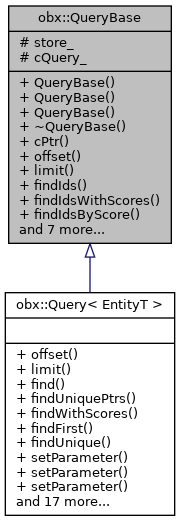|
| | QueryBase (Store &store, OBX_query_builder *qb) |
| | Builds a query with the parameters specified by the builder.
|
| |
| | QueryBase (const QueryBase &query) |
| | Clones the query.
|
| |
| | QueryBase (QueryBase &&source) noexcept |
| |
| virtual | ~QueryBase () |
| |
| OBX_query * | cPtr () const |
| |
| QueryBase & | offset (size_t offset) |
| | Sets an offset of what items to start at. This offset is stored for any further calls on the query until changed. Call with offset=0 to reset to the default behavior, i.e. starting from the first element.
|
| |
| QueryBase & | limit (size_t limit) |
| | Sets a limit on the number of processed items. This limit is stored for any further calls on the query until changed. Call with limit=0 to reset to the default behavior - zero limit means no limit applied.
|
| |
| std::vector< obx_id > | findIds () |
| | Returns IDs of all matching objects. Note: if no order conditions is present, the order is arbitrary (sometimes ordered by ID, but never guaranteed to).
|
| |
| std::vector< std::pair< obx_id, double > > | findIdsWithScores () |
| | Find object IDs matching the query associated to their query score (e.g. distance in NN search). The resulting vector is sorted by score in ascending order (unlike findIds()).
|
| |
| std::vector< obx_id > | findIdsByScore () |
| | Find object IDs matching the query ordered by their query score (e.g. distance in NN search). The resulting array is sorted by score in ascending order (unlike findIds()). Unlike findIdsWithScores(), this method returns a simple vector of IDs without scores.
|
| |
| void | visit (obx_data_visitor *visitor, void *userData) |
| | Walk over matching objects one-by-one using the given data visitor (C-style callback function with user data). Note: if no order conditions is present, the order is arbitrary (sometimes ordered by ID, but never guaranteed to).
|
| |
| void | visitWithScore (obx_data_score_visitor *visitor, void *userData) |
| | Walk over matching objects one-by-one using the given data visitor (C-style callback function with user data). Note: the elements are ordered by the score.
|
| |
| uint64_t | count () |
| | Returns the number of matching objects.
|
| |
| size_t | remove () |
| | Removes all matching objects from the database & returns the number of deleted objects.
|
| |
| QueryBase & | setParameter (obx_schema_id entityId, obx_schema_id propertyId, const char *value) |
| | Change previously set condition value in an existing query - this improves reusability of the query object.
|
| |
| QueryBase & | setParameter (obx_schema_id entityId, obx_schema_id propertyId, const std::string &value) |
| |
| QueryBase & | setParameter (obx_schema_id entityId, obx_schema_id propertyId, int64_t value) |
| |
Query allows to find data matching user defined criteria for a entity type. Created by QueryBuilder and typically used with supplying a Cursor.
